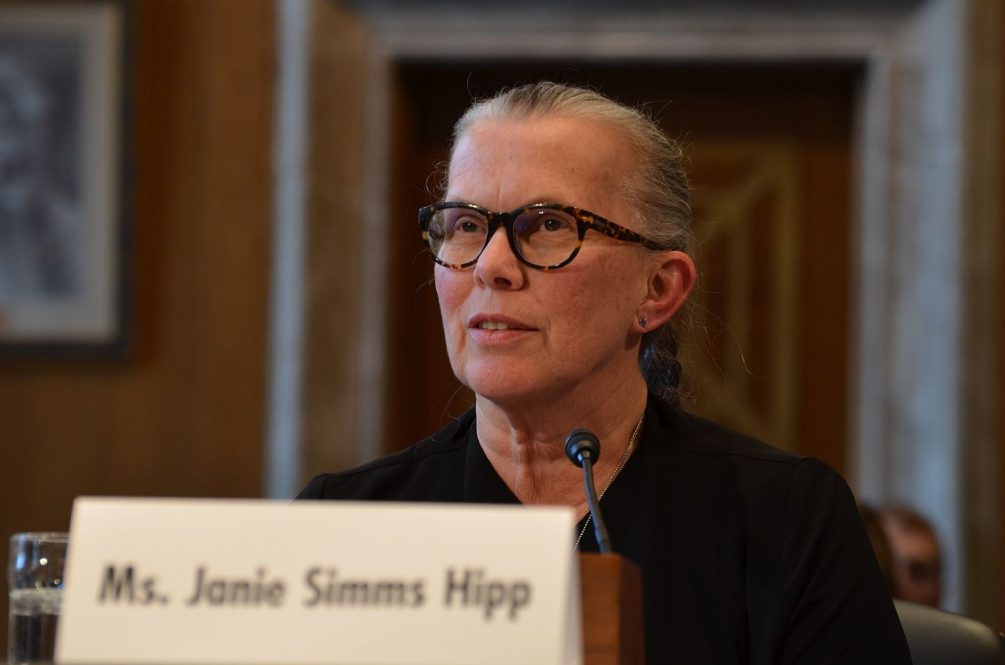Janie Simms Hipp, General Counsel for the U.S. Department of Agriculture, has dedicated her distinguished career to advocating for farmers and ranchers throughout the U.S. agriculture sector and legal system.
Hipp will deliver the 2023 commencement address for the College of Agriculture, Health and Natural Resources.
“The challenges before us are profound,” Hipp says. “I can’t think of a better time to be focusing on food and agriculture, writ large.”
Hipp, a member of the Chickasaw Nation, is originally from Idabel, Oklahoma, a small rural town where she grew up surrounded by farmers and ranchers. Hipp’s grandfather ran a tractor dealership. Hipp helped her grandfather with the business and would overhear farmers telling stories about their work when they came by for a cup of coffee on Saturdays.
I can’t think of a better time to be focusing on food and agriculture, writ large.
Hipp received a bachelor’s degree in social work from Oklahoma State University. After graduating, Hipp began working in the public sector on mental health and substance abuse programs.
Hipp, who has since established herself as a respected national expert on agricultural law, went to law school on a dare. After a decade of working for the state, one of her supervisors dared Hipp to go to law school, which would allow her to expand her career options.
“I never thought about it, because I always thought [law school] was a place for super smart people who were well-connected, who were politically savvy, and who had a family pedigree in law,” Hipp says. “I just never saw that in my own family, I had no frame of reference.”
Hipp attended Oklahoma City University School of Law. When she completed her degree in 1984, the country was in the midst of a farm crisis.
Despite initially pursuing a career in commercial litigation, Hipp was soon drawn into the crisis unfolding in her community.
“I found I could not take people’s homes and farms away from them,” Hipp says.
Hipp left private practice and joined the Oklahoma’s Attorney General’s Office where she was assigned to advise the Attorney General and the Oklahoma state legislature on how to best help the agricultural sector navigate the financial crisis.
“I’ve always had my finger in the advocacy piece of it and really on the ground with farmers and ranchers,” Hipp says.
As her expertise and interest in agricultural law grew, Hipp decided to pursue a master’s in law at the University of Arkansas in their new program in agricultural and food law – the first in the country.
“I don’t know of any other Native person who was there that early in that space and there were just a handful of women who were doing it at that time,” Hipp says. “It was really exciting to be there that early for something that was developing.”
Hipp’s legal work has remained committed to advocacy for farmers, especially Indigenous farmers, whose importance to this sector is often overlooked, even though agriculture is the second-largest economic driver in Indian Country.
Hipp was the founding CEO of the Native American Agriculture Fund, a philanthropic organization that supports Native farmers and ranchers. This ongoing project emerged from a class action settlement against the USDA in 2018.
“That was a huge accomplishment because we really needed to build it up from scratch,” Hipp says. “I was there with a piece of paper (the settlement agreement) and a quarter of a billion dollars, and we had to get it running.”
Hipp also founded the Indigenous Food and Agriculture Initiative at the University of Arkansas School of Law. This initiative serves as a national center for establishing legal frameworks in food and agriculture to support tribal governments and their exercise of sovereignty in food systems.
The creation of an expansive model legal code is necessary because agriculture law touches on multiple legal areas including economic, environmental, social, and cultural.
The model the initiative provides helps tribal governments support their farmers and maintain cultural traditions and tribal sovereignty.
“The legal framework that sits up under agriculture itself allows it to survive and thrive and be resilient as something that is not only critical to national security in every country, but fundamental to our ability to survive,” Hipp says.
In 2021, Hipp was appointed by Pres. Joe Biden and confirmed by the Senate to her current role. Hipp is the first Indigenous person and one of the only four women to hold this role.
Hipp describes the USDA as a “melting pot” of interests given agriculture’s multifaceted nature.
“It’s a Rubik’s cube of interests and focus areas,” Hipp says. “That’s what makes the work at USDA so wonderful to me. I don’t know how you get bored in our space. It’s an incredible area to work in.”
Hipp says this year’s graduates should be prepared for anything, but that now is an exciting time to be entering the professional world.
The global population reaching an unprecedented size in an ongoing climate crisis has created profound challenges for agriculture, health, and natural resources that require innovative solutions for which there are few roadmaps.
“I’m excited for what you are going to put on the table and help to build,” Hipp says. “Because I do think we’re in a place where we’re going to have to build some new ideas and new structures and new ways of thinking around all of these issues if we’re going to feed all these people.”
Hipp urges young people to use their education and creativity to become leaders on these urgent questions.
“The way we’re going to solve the future’s problems and challenges in these arenas is going to require multidisciplinary multifaceted problem solving,” Hipp says. “I think the younger generation is in the best place they could possibly be to emerge quickly and lead in this space.”
Follow UConn CAHNR on social media



